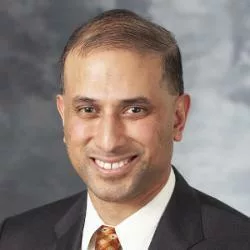Expanding Research on PTSD Treatment Among Inmates
Michael Koenigs, PhD, professor of psychiatry at UW School of Medicine and Public Health, is leading a study that will offer group cognitive processing therapy (CPT) to Wisconsin inmates with PTSD.
A recent grant to a team from the University of Wisconsin, UW Health, and the Marshfield Clinic Research Institute will help them develop and test an advanced surveillance system to identify future waves of the COVID-19 pandemic and provide training to front-line providers caring for those patients.
This project, led by Manish Shah, MD, MPH, professor of emergency medicine; and collaborators at UW, UW Health and the Marshfield Clinical Research Institute, will use a strategic COVID-19 Response Grant from the Wisconsin Partnership Program at the UW School of Medicine and Public Health for the project WIsconsin Real-time Emergency Department surveillance and Responsive Training (WIRED-RT).

A lesson of the COVID-19 crisis is that early recognition of a public health emergency is critical to prepare hospitals and emergency department providers to care for their communities. Early warning that a surge in COVID-19 patients needing to be placed on ventilators in the emergency department can result in additional training on the newest treatments and ensure sufficient staff members are available to safely care for the patients. In the past, physicians and nurses would notice these trends and informally notify colleagues, leading to an organized response. In 2020, however, this surveillance can be formalized by harnessing electronic health records databases to identify and respond to emerging illnesses earlier and better than ever before.
Because patients suffering from emerging infectious diseases like COVID-19 tend to first go to emergency departments for care, the emergency department medical records can serve as a rich source of data. State-wide and national syndromic surveillance programs exist and use these data to provide robust aggregate measures and population trends. However, the opportunity exists to use detailed, timely, and local information from the electronic health records. By applying modern data science techniques and predictive analytics, this information can lead to actionable insights into the nature of the emerging illnesses and drive structured and rapid public health, health system and emergency department operational responses.
The grant for $125,000 will support efforts to develop and test an expanded surveillance system to identify future waves of the COVID-19 pandemic and provide training to providers caring for those patients. The system will use predictive analytics, linked to a just-in-time, simulation-based training infrastructure, thereby facilitating early and targeted responses for the evolving COVID-19 pandemic. As shown through the current COVID-19 pandemic, identifying pending crises even a few days earlier gives leaders the opportunity to intervene, thereby drastically change event trajectories.
While this project responds to the COVID-19 pandemic, their approach applies to other public health emergencies identifiable through the emergency department, including opioid overdoses, vaping related lung injuries, among others. This capability will enable a proactive public health and hospital response that can reduce suffering and save lives.
Collaborators include Brian W. Patterson, MD, MPH; Assistant Professor of Emergency Medicine; Medical Director, Clinical Informatics, Emergency Medicine, Physician Informatics Director, Predictive Analytics, UW Health; Michael Pulia, MD, MS, Assistant Professor of Emergency Medicine; Director, Antimicrobial Stewardship, Emergency Medicine; Ryan Thompson, MD, CHSE, Assistant Professor of Emergency Medicine; Medical Director, UW Health Clinical Simulation Program; Justin Boutilier, PhD, Assistant Professor, Department of Industrial and Systems Engineering; Frank Liao, PhD, Director of Data Science and Advanced Analytics, UW Health; Radha Nagarajan, PhD, Director of Center for Oral and Systemic Health (COSH), Marshfield Clinical Research Institute and Amit Acharya, BDS, MS, PhD, Executive Director, Marshfield Clinical Research Institute.
The Wisconsin Partnership Program at the UW School of Medicine and Public Health has awarded 24 grants, totaling nearly $3 million in COVID-19 Response grants to UW–Madison researchers and community organizations across Wisconsin to address the COVID-19 pandemic.